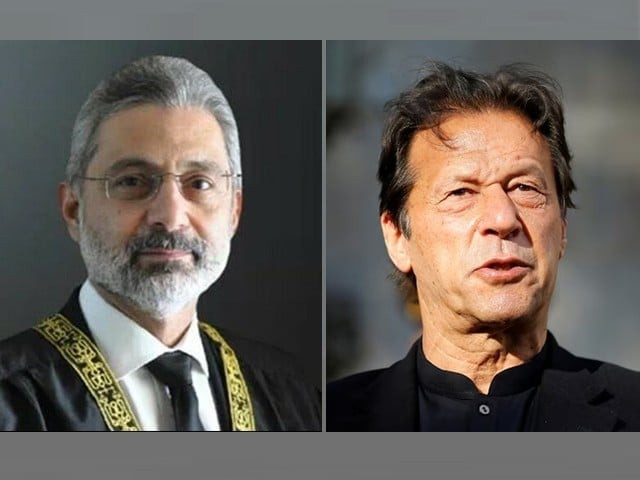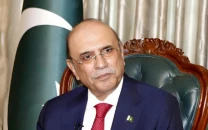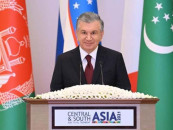PTI pushes for CJP Isa's exit from all cases
In a formal application, Imran alleges CJP is biased towards him and party

The friction between Pakistan Tehreek-e-Insaf (PTI) and Chief Justice of Pakistan (CJP) Qazi Faez Isa has escalated as former prime minister Imran Khan has formally requested the latter’s exclusion from benches hearing cases related to him, his family, and his party.
"The applicant does not believe that he, his spouse and family, PTI, and its members of Sunni Ittehad Council (SIC) will be fairly dealt with in accordance with the law and constitution by his lordship Justice Qazi Faez Isa in any matter presently pending before the court or any matter that may come up in the future," states the five-page application to be submitted to the three-judge committee led by CJP Isa today (Wednesday).
Justice Syed Mansoor Ali Shah and Justice Munib Akhtar are also members of this committee, established under the Supreme Court Practice and Procedure Act 2023, to constitute benches and fix cases. The application has been signed by Imran Khan.
Imran Khan asserted that he had hoped the past would fade upon Justice Isa’s assumption of office, but he now perceives this has not happened. The application argued that Justice Isa's presence on benches involving the applicant, PTI, or SIC would undermine public confidence in the judicial process.
It stated that the former prime minister had, in good faith expected that on the assumption of the high office of the chief justice of Pakistan, the past would fade away.
However, it is increasingly clear that this has not happened. The conduct and demeanour of CJP Isa Isa while hearing matters involving the applicant, the PTI, its members, or the SIC have led the applicant to believe that the CJPA’s presence in benches hearing matters in which the applicant, his spouse, his family, the PTI, and its members of SIC have an interest will undermine the confidence of a large portion of the Pakistani public in the impartiality of the judicial process.
Interestingly, Imran Khan has accused CJP Isa of bias on two grounds.
Firstly, he stated that the filing of a presidential reference regarding Justice Isa's removal in 2019 was taken as a personal assault by Justice Isa and his wife, Sarina Isa. He referred to news reports of Sarina Isa's open letter to Imran Khan, wherein she expressed anger and even sought his removal as PM over the non-disclosure of assets and tax issues.
"The instances described above of adverse opinions and sentiments expressed by the honourable wife of Chief Justice Isa are not exhaustive of the events and circumstances that have caused 'apprehension of bias' as well as the 'possibility of bias' in the mind of the Applicant," states the application.
"Such apprehension and possibility are likely to have arisen in the minds of most reasonable and fair-minded observers of the judicial process. It is established jurisprudence around the world, particularly in common law jurisdictions, that extra-judicial statements of a judge or persons closely associated with the judge can be the basis for the apprehension and possibility of bias. In this regard, reference may readily be made to the judgment of the UK House of Lords in the case of R. v. Bow Street Metropolitan Stipendiary Magistrate, ex p Pinochet Ugarte (No. 2) ([2000] 1 AC 119).
"It will be recalled that in the aforesaid landmark judgment on the possibility of bias, a judgment of the House of Lords was set aside on account of the presence on the bench of a judge whose wife had known views and associations adverse to those of the litigant, Pinochet."
Secondly, Imran Khan referred to a five-judge larger bench order wherein then-CJP Gulzar Ahmed stated that Justice Faez Isa should not hear matters about the then-government headed by him.
Imran Khan prayed to the committee that CJP Isa should not be included in any bench constituted to hear any matter in which he, his spouse, family, PTI, its members, or SIC have an interest.
It has been observed that the PTI does not have a consistent policy on CJP Qazi Faez Isa, who is hearing various cases related to the party and its leaders.
One of the PTI’s counsels, Niazullah Niazi, raised objections to CJ Isa, who was leading a bench hearing the Election Commission of Pakistan (ECP) petition against the Lahore High Court judgment regarding the appointment of election tribunals. However, another PTI counsel, Salman Akram Raja, who is a respondent in the same case, did not endorse Niazi’s viewpoint.
CJ Isa was visibly annoyed with Niazi’s objections and warned that he would refer the lawyer’s case to the Pakistan Bar Council (PBC) for disciplinary action. “This scandalising must stop. Enough is enough,” said CJ Isa.
This is not the first time a contradiction has been observed in the PTI’s policy on the judge. The PTI core committee decided to object to CJ Isa’s presence on the bench hearing the reserved seats case. PTI leader Raoof Hasan expressed his mistrust of CJ Isa in a press conference.
However, Faisal Siddiqi, the counsel for the Sunni Ittehad Council (SIC)—a party comprising PTI-backed lawmakers—did not agree with the party. He made it clear that if the PTI wanted to object to the CJ, then he might withdraw his vakalatnama.
The relationship between CJ Isa and the PTI has been tense since the filing of a presidential reference regarding his removal in May 2019, when the party was in power. At that time, there was a cordial relationship between the PTI and the security establishment, and both had made a joint effort to remove Justice Isa.
When the relationship between the powers that be and the PTI turned sour after the ouster of the party’s government in April 2021, PTI leaders started saying that filing the presidential reference against Justice Isa was a mistake.
The PTI also supported former CJ Umar Ata Bandial’s camp in judicial politics. When Justice Isa took charge as the CJ in September last year, PTI leaders were hopeful that he would rescue them from persecution at the hands of the establishment.
However, CJ Isa endorsed state institutions’ narrative against the PTI. He also expressed concern over the use of social media for launching campaigns against judges. Justice Isa did not give any major relief to the PTI.
The situation changed after the January 13 order of a bench led by CJ Isa that declared PTI’s intra-party elections illegal. Subsequently, the PTI was deprived of its election symbol.
Later, the party’s legal team was disappointed with the SC’s decision and withdrew a contempt petition filed against the Election Commission of Pakistan (ECP) and the executive authorities for not implementing the court’s order to provide a level playing field to the party during the elections.
It has been observed that political parties have generally failed to get relief by raising objections to judges. When the PDM-led government was showing mistrust of former CJ Bandial, the superior bars led by the Independent Group backed it. However, now the bar led by the same group is fully supporting CJ Isa.
It is noted that several lawyers are not satisfied with the judiciary’s role in recent elections that are marred by allegations of rigging. T
hey, are also raising objections to the January 13 order of the SC, due to which the PTI is facing difficulty in getting reserved seats in legislatures, as well as the SC’s decision to suspend its earlier verdict in the military court's case and the arrest of female PTI workers.
Currently, CJ Isa is hearing three significant cases related to elections.
Somehow, the PTI needs to understand that the judiciary is the only institution that can redress its grievances.
When the PTI’s relationship was cordial with the security establishment, the superior courts were giving it relief. Now, the relationship between the establishment and the PTI is tense, and the party is finding it difficult to get decisions in its favour.
PTI leaders are showing mistrust of CJ Isa, but he is consistent and has not tried to alter the perception of being biased toward the PTI.



















COMMENTS
Comments are moderated and generally will be posted if they are on-topic and not abusive.
For more information, please see our Comments FAQ